- Afrikaans
- Albanian
- Amharic
- Arabic
- Armenian
- Azerbaijani
- Basque
- Belarusian
- Bengali
- Bosnian
- Bulgarian
- Catalan
- Cebuano
- chinese_simplified
- chinese_traditional
- Corsican
- Croatian
- Czech
- Danish
- Dutch
- English
- Esperanto
- Estonian
- Finnish
- French
- Frisian
- Galician
- Georgian
- German
- Greek
- Gujarati
- haitian_creole
- hausa
- hawaiian
- Hebrew
- Hindi
- Miao
- Hungarian
- Icelandic
- igbo
- Indonesian
- irish
- Italian
- Japanese
- Javanese
- Kannada
- kazakh
- Khmer
- Rwandese
- Korean
- Kurdish
- Kyrgyz
- Lao
- Latin
- Latvian
- Lithuanian
- Luxembourgish
- Macedonian
- Malgashi
- Malay
- Malayalam
- Maltese
- Maori
- Marathi
- Mongolian
- Myanmar
- Nepali
- Norwegian
- Norwegian
- Occitan
- Pashto
- Persian
- Polish
- Portuguese
- Punjabi
- Romanian
- Russian
- Samoan
- scottish-gaelic
- Serbian
- Sesotho
- Shona
- Sindhi
- Sinhala
- Slovak
- Slovenian
- Somali
- Spanish
- Sundanese
- Swahili
- Swedish
- Tagalog
- Tajik
- Tamil
- Tatar
- Telugu
- Thai
- Turkish
- Turkmen
- Ukrainian
- Urdu
- Uighur
- Uzbek
- Vietnamese
- Welsh
- Bantu
- Yiddish
- Yoruba
- Zulu
Efficient Meat Conveyor Systems | AI-Optimized Handling
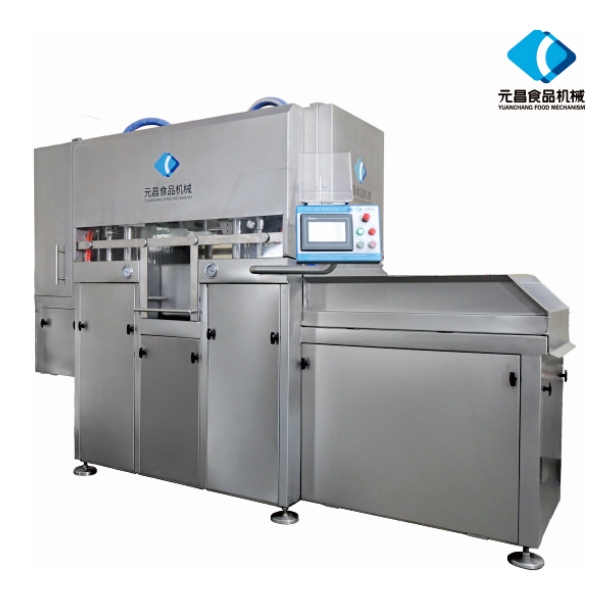
1. Industry Trends: The Evolution of Meat Conveyors & Meat Processing Automation
Meat conveyors are the backbone of modern meat processing plants, enabling seamless transfer, sorting, and processing of meat products. With the tightening of food safety regulations (e.g., ISO 22000, FDA FSMA) and the rise of Industry 4.0 technologies, facilities are increasingly seeking high-precision, hygienic, and customizable conveying solutions.
- Trend #1: Integration of smart sensors & PLCs for real-time monitoring and data logging
- Trend #2: Utilization of corrosion-resistant stainless steels (304/316L) for enhanced hygiene and durability
- Trend #3: Custom conveyor designs to accommodate various meat curing and cutting accessories
- Trend #4: Demand for energy-efficient motors and conveying systems to reduce operational costs by up to 18% (source: Food Engineering)
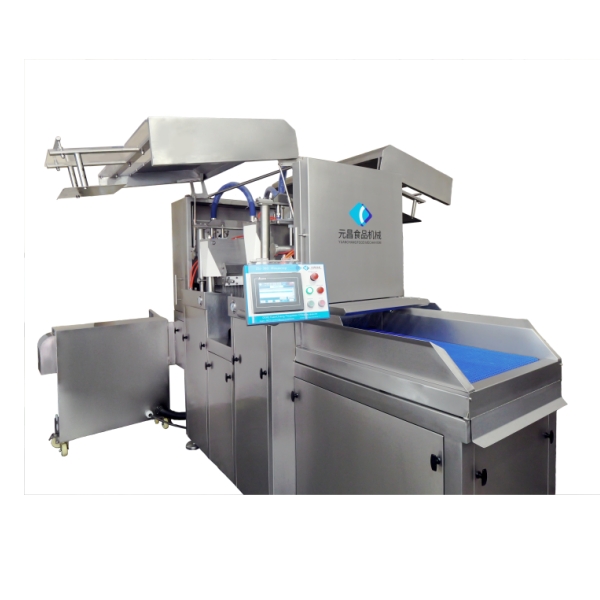
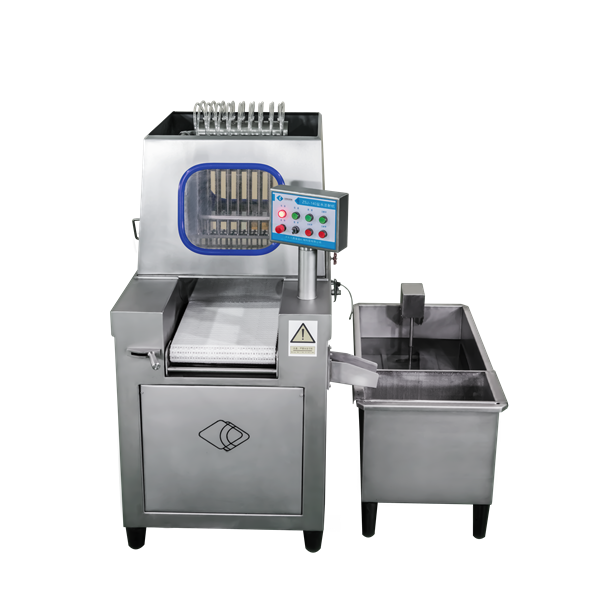
2. Technical Comparison Table: Core Parameters for Meat Conveyors & Related Equipment
| Equipment Type | Belt Width (mm) | Material | Load Capacity (kg/h) | Temperature Tolerance (°C) | Certification | Main Application |
|---|---|---|---|---|---|---|
| Meat Conveyors | 300-1200 | 304/316L Stainless Steel | 1,200 - 12,000 | -40 to +80 | CE, ISO 22000, FDA | Transfer, sorting, inspection |
| Meat Curing Machines | 500-900 | 316L SS, food-grade plastics | 2,000 - 7,000 | 0 to +50 | CE, HACCP | Brine injection, massaging |
| Frozen Meat Dicing Machines | 300-700 | 304 SS, hardened steel blades | 500 - 2,000 | -55 to +30 | CE, ISO, FDA | Dicing, cubing |
| Industrial Meat Equipment | Customized | Carbon steel, SS alloys | 10,000+ | As specified | ISO, ANSI, FDA | Full-line automation |
3. Saline Injector: Product Highlights & Manufacturing Process of Meat Conveyors
Raw Material Preparation → Precision Cutting (CNC Laser/Plasma) → Component Forming (Forging, Casting, Bending) → Surface Treatment (Electropolishing, Bead Blasting) → Assembly (Motors, Sensors, Accessories) → Quality Testing (ISO 9001, ANSI B11.19) → Final Packaging & Shipment
*Each node is monitored for tolerance (ISO 2768) and sanitation (EHEDG/FDA) compliance.
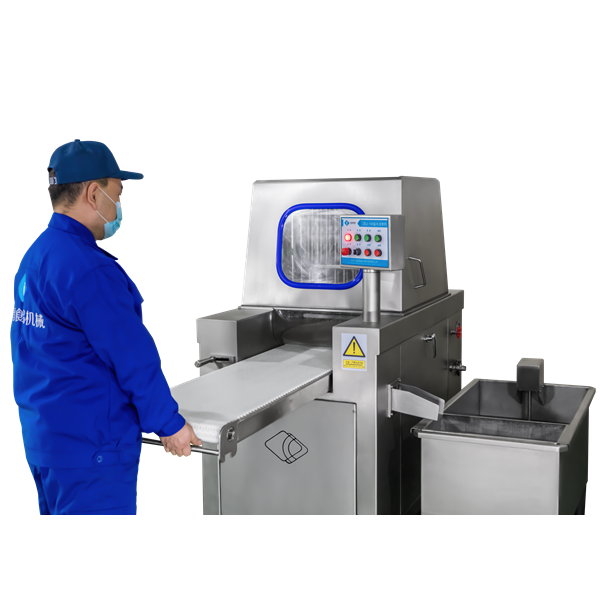
- Material: 304/316L Stainless Steel or higher, ensuring high corrosion resistance, anti-microbial performance, and ease of cleaning.
- Manufacturing Process: CNC machining for dimensional accuracy (+/-0.2mm), robotic welding, electropolishing for optimal finish.
- Inspection Standards: ISO 9001, FDA FSMA, ANSI B11.19, CE, HACCP and customer-specific protocols.
- Design Life Expectancy: Over 15 years under standard operational cycles.
- Industries Served: Meat/poultry/seafood, food service, pharmaceuticals, chemical plants, metallurgy (for heavy-duty chain conveyors), water treatment (sanitary conveyors).
- Typical Advantages: Energy efficiency (up to 17% savings), anti-corrosion (standards per ASTM A240), customizable to fit plant layouts with flexible accessories.
Saline Injector Detailed Specifications:
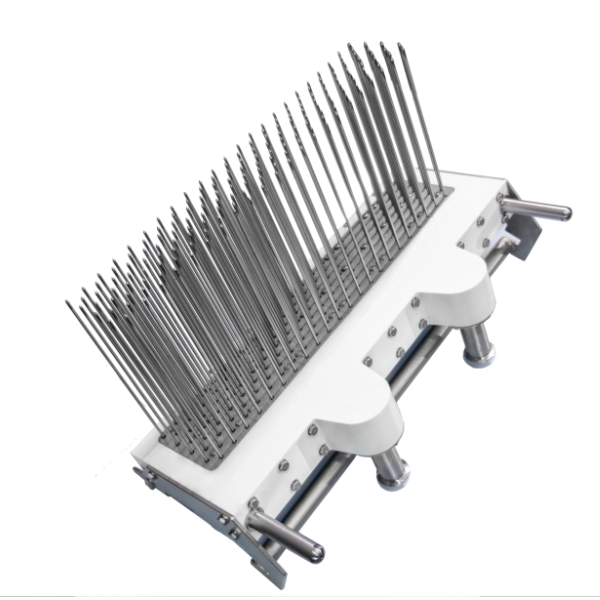
| Parameter | Yancheng Saline Injector |
|---|---|
| Injection Capacity | 600–2,400 kg/h |
| Nozzles | 24–112 (customizable) |
| Material | 316L Stainless Steel |
| Brine Pressure | 0.2 – 0.6 MPa |
| Control Panel | PLC Touchscreen, multi-language |
| Certification | CE, ISO 9001, HACCP |
| Special Feature | Automatic cleaning, filter, high injection uniformity (>95%) |
4. Technical Indicators: Data Visualization & Product Comparison
5. Manufacturer Comparison: Meat Conveyors & Saline Injector Producers
| Brand | Origin | Certifications | Main Products | Customization | After-sales Service |
|---|---|---|---|---|---|
| YC MeatMech | China | ISO 9001, CE, FDA, HACCP | Saline Injector, meat conveyors, dicing/cutting/curing equipment | Fully tailored (layout, voltage, nozzles, size, controls) | 24/7 online; onsite commissioning; multi-year warranty |
| Marel | Iceland | ISO, CE, FDA | Cutting, dicing, portioning machines | Partial | Europe-wide, 48hr standby |
| GEA Group | Germany | ISO, CE, FDA | Complete lines, slicing, mixers | Partial | Global network |
| Laska | Austria | CE, ISO | Grinders, mixers, cutters | Minimal | Europe/Africa |
6. Tailored Solutions: Custom Meat Conveyors & Accessories
- Layout Design: Optimize for space utilization in new or existing factories; integration with brining, dicing, and packaging lines.
- Material Selection: Available in 304/316L stainless steel, POM/acetal/PP for belts; all meet FDA/EFSA standards, guaranteed traceability.
- Controls & Automation: Incorporate PLC/HMI, auto-sorting, load cells, AI-based defect detection for maximum yield.
- Accessory Integration: Incorporate chillers, metal detectors, X-ray, cleaning-in-place (CIP) systems seamlessly.
- Certifications: Custom design process certified per ISO 9001/22000, FDA, and customer's country specific food processing standards.
7. Application Scenarios: Real Case Studies of Meat Conveyors
- Leading Meat Processor, Germany: Retrofit of full meat conveyors and saline injector system reduced manual handling by 80%, improved injection uniformity to 96.2%, and cut cleaning downtime by 40%. (Certified to ISO 22000 & FDA).
- Poultry Exporter, Brazil: Integrated meat cutting accessories and brining, with frozen meat dicing machine line, achieved 22% higher throughput and 1.6% waste reduction. Customers cited improved traceability and easy changeovers.
- Multinational Ready-to-eat Manufacturer, China: Automated conveyor-based loading and saline injection allowed full compliance with new HACCP and US FDA standards for export, and reduced labor by three operators per shift.
8. Professional FAQ – Industry Terminology Explained
-
Q: What grade of stainless steel is typically used for meat conveyors?
A: 304 and 316L are industry standards. 316L offers higher corrosion resistance, especially against brine and salt, and meets ASTM A240, FDA and EHEDG hygiene guidelines. -
Q: What is the significance of ISO 22000 certification for meat equipment?
A: ISO 22000 certifies robust food safety management in design/construction, a must for exporting to Europe, USA, and high-regulation markets. -
Q: What are the main belt types used in meat conveyors?
A: Modular plastic belts (POM/Acetal), stainless link chains, and seamless PU/TPU belts; all ensure easy cleaning and temperature stability. -
Q: How is installation tolerance for conveyor systems ensured?
A: All frames and rollers are manufactured to ISO 2768-mK or tighter, and leveled using laser alignment & NIST-traceable measurement tools. -
Q: What is the importance of IP65/IP67 rating for control boxes?
A: Ensures water-jet and dust resistance, which is key for hygiene and for electronics during washdown cycles in food plants. -
Q: Can I customize conveyor length/height/accessories?
A: Yes; nearly all high-end manufacturers offer tailored solutions, including variable speed drives, guides, infeed/outfeed options, and full plant layout design. -
Q: How is product data tracked along the meat conveyors line?
A: Via PLC & cloud integration: each batch is logged, with QR/barcode traceability meeting GS1/FDA and EU food safety standards.
9. Delivery, Warranty, and Customer Support
- Delivery Cycle: 25–60 working days, depending on level of customization and factory acceptance testing (FAT).
- Warranty: Standard 18–24 months; optional extension up to 5 years. Lifetime technical support for major meat conveyors and brining equipment.
- Customer Support: 24/7 hotline, online spare parts ordering, remote video troubleshooting, and multilingual documentation for installation, operation, and maintenance.
- Onsite Service: Available globally (China, EU, North & South America, ASEAN). Includes full training and process validation to meet FDA/EU QA protocols.
- References: Over 3,800 installations in 35+ countries. Trusted by leading names in food processing including Smithfield Foods, JBS, and WH Group.
10. Why Choose YC MeatMech Meat Conveyors?
- Proven Quality: All equipment certified, complies with EU FDA/CE regulations, and tested per ISO 9001 and ANSI B11.19 standards.
- Long-term ROI: Energy-efficient motors and seamless hygienic design leading to labor and power savings.
- One-stop Solution: Supply chain from curing/brining, dicing to packaging—complete turnkey plant setup with full technical support.
- Strong After-service: Global network of engineers, remote assistance, and rapid on-site intervention where required.
Conclusion & Industry References
In the evolving landscape of food processing, high-precision meat conveyors, saline injectors, and associated accessories now stand as the new industry benchmark. Success hinges on compliance with a growing matrix of global standards, a commitment to hygiene and traceability, and the ability to tailor every link in the chain—from dicing and brining to packaging and logistics.
YC MeatMech offers not only advanced engineering, but a proven track record of reliability, world-class certifications (FDA, ISO, CE), and client trust across 30+ countries. For full technical details, real-world demos, and tailored consultation, please visit the official product page: Saline Injector & Meat Conveyors.
- Markwart, C. (2023) “Best Practices in Hygienic Conveyor Design,” in Meat Science, https://www.sciencedirect.com/science/article/abs/pii/S0309174022004533
- Food Processing Forum (2023), “Automation Trends for Meat Handling Equipment,” https://www.foodprocessing.com/forum/
- FDA Food Safety Modernization Act (FSMA) official standards, https://www.fda.gov/food/food-safety-modernization-act-fsma
- EHEDG (European Hygienic Engineering & Design Group), "Guidelines for Food Conveyor Equipment"
https://www.ehedg.org/guidelines/
-
AI-Powered Bowl Chopper for Fast PreparationNewsAug.01,2025
-
Premium Hopper Trolley | Ideal for Effortless TransportNewsAug.01,2025
-
Vacuum Bowl Cutter ZKB-125 - Hebei Yuanchang Food Mechanism & Technology Co., Ltd.NewsAug.01,2025
-
Vacuum Bowl Cutter ZKB-125-Hebei Yuanchang Food Mechanism & Technology Co., Ltd.|Vacuum Processing, Meat Pet Food EquipmentNewsAug.01,2025
-
Vacuum Bowl Cutter ZKZB-125-Hebei Yuanchang Food Mechanism & Technology Co., Ltd.NewsJul.31,2025










